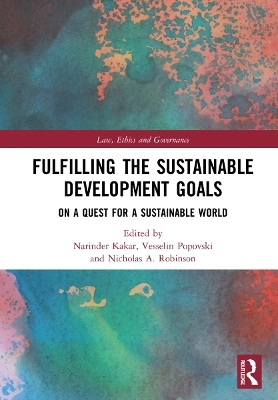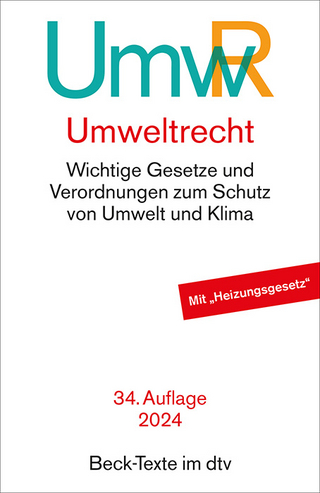
Fulfilling the Sustainable Development Goals
Routledge (Verlag)
978-0-367-70025-6 (ISBN)
This book contains assessment of the progress, or the lack of it, in implementing the UN Sustainable Development Goals (SDGs). Through review of the assessments and of case studies, readers can draw lessons from the actions that could work to positively address the goals.
The 2030 Agenda for Sustainable Development is designed to catalyze action in critical areas of importance to humanity and the planet. The effort to implement the SDGs, however, demands a sense of urgency in the face of environmental degradation, climate change, emerging conflicts, and growing inequality, among a number of other socio-economic problems. Five years after the launch of the 2030 Agenda, this book takes stock of how far the world has come and how we can position ourselves to achieve the global targets. The book is one of the first to assess how the implementation is impeded by the onset of COVID-19. It contains a special chapter on COVID-19 and the SDGs, while many thematic chapters on different SDGs also assess how COVID-19 adversely affects implementation, and what measures could be taken to minimize the adverse effects.
This publication thus provides a fresh look at implementation of the SDGs highlighting impactful and creative actions that go beyond the business-as-usual development efforts. The volume reinforces this analysis with expert recommendations on how to support implementation efforts and achieve the SDGs through international and national strategies and the involvement of both the public and private sectors. The result is an indispensable textual tool for policy makers, academia, intergovernmental organizations (IGOs) and non-governmental organizations (NGOs), as well as the public, as we march toward the 2030 deadline.
Narinder Kakar is Director of the Sustainable Development Research Program and Distinguished Senior Fellow at the Global Center for Environmental Legal Studies, Elisabeth Haub School of Law at Pace University, USA, and Permanent Observer to the UN for the University of Peace, Costa Rica. Vesselin Popovski is Professor and Vice Dean and Executive Director at the Center for the Study of United Nations, Jindal Global Law School, Sonipat, India. Nicholas Robinson is University Professor for the Environment at the Elisabeth Haub School of Law at Pace University, USA.
Foreword
Preface
I SDGs in CONTEXT
A. Special Introduction: H.E.
B. Multilateralism Under Challenge:
C. COVID-19 and the SDGs:
II IMPLEMENTING THE SDGs
P E O P L E
Chapter 1: Extreme Poverty Eradication: Conceptual Evolution and Policy Challenges
Chapter 2: Critical Assessment of the Latest Progress in Eradication of Extreme Poverty
Chapter 3: Achieving Zero Hunger Using a Rights-based Approach to Food Security and Sustainable Agriculture
Chapter 4: Health and Sustainable Development: Assessing Progress and Challenges
Chapter 5: Gender Equality and Women Empowerment: Critical Assessment of the Implementation of SDG 5
Chapter 6: Sustainable Management of Water and Sanitation: A Long and Winding Road Ahead
Chapter 7: Inclusive, Safe, and Resilient Cities and Settlements
P R O S P E R I T Y
Chapter 8: Inclusive and Equitable Quality Education: Why Are We Missing the Mark?
Chapter 9: Environmental Education
Chapter 10: STEM Education: Environmental Restoration Science in New York Harbor
Chapter 11: Working Together Toward Sustained and Inclusive Growth
Chapter 12: The Road to Sustainable Industrialization
Anna Shostya
Chapter 13: Reducing Inequality and Sharing Opportunities for All
P L A N E T
Chapter 14: Accelerating the Energy Transformation
Chapter 15: Toward Sustainable Consumption and Production
Chapter 16: Missing Climate Action: Gaps in the Implementation of the Paris Agreement on Climate Change
Chapter 17: Climate Change and Small Islands
Chapter 18: Achieving SDG 14: Time for a Global Ocean Approach
Chapter 19: Legal Tools in Combating Marine Pollution and Mitigating the Effects of Acidification
Chapter 20: Marine Pollution: Maximizing Synergies for Transformative Changes
Chapter 21: Sustainable Use of Terrestrial Ecosystems and Protection of Biodiversity
Chapter 22: Restoration of Ecosystems and Land Degradation Neutrality
P E A C E
Chapter 23: Peaceful Societies and Leaving No One Behind
Chapter 24: Nigeria’s Alternative Pathway to Peace
P A R T N E R S H I P
Chapter 25: Partnering for a Better World: Shift from Sustainable Finance to Financing Sustainable Development
Chapter 26: Private Corporations and Environmental Social Governance: An Uneven Response
Chapter 27: From Means of Implementation to Implementation of Means: Realizing the SDGs as if they Matter
III INTEGRATING THE SDGs
Chapter 28: Interlinkages between Climate Change, Economic Inequality, and Human Migration
Chapter 29 Indigenous Peoples, the SDGs, and International Environmental law
Chapter 30: Codification and Implementation of Customary International LawJuan
Chapter 31: Integrating the SDGs through "One Health"
IV CONCLUSIONS
Chapter 32: Pathways to 2030
| Erscheinungsdatum | 01.09.2021 |
|---|---|
| Reihe/Serie | Law, Ethics and Governance |
| Zusatzinfo | 6 Tables, black and white; 5 Line drawings, black and white; 3 Halftones, black and white; 8 Illustrations, black and white |
| Verlagsort | London |
| Sprache | englisch |
| Maße | 174 x 246 mm |
| Gewicht | 453 g |
| Themenwelt | Recht / Steuern ► Allgemeines / Lexika |
| Recht / Steuern ► EU / Internationales Recht | |
| Recht / Steuern ► Öffentliches Recht ► Umweltrecht | |
| Sozialwissenschaften ► Soziologie ► Spezielle Soziologien | |
| ISBN-10 | 0-367-70025-5 / 0367700255 |
| ISBN-13 | 978-0-367-70025-6 / 9780367700256 |
| Zustand | Neuware |
| Haben Sie eine Frage zum Produkt? |
aus dem Bereich


